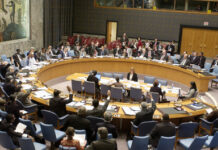Photo Credit: Global Diaspora News (www.GlobalDiasporaNews.com).
By: Rosalind Ghafar Rogers, PhD, LMHC, Clinical Behavioral Health Subject Matter Expert with USCRI’s Refugee Health Services in Arlington, VA
As a result of conflicts and natural disasters, the human rights of millions are under threat, including at least 4.5 billion people who did not have full access to essential health services in 2021 (WHO, n.d.-a). To address these challenges and mark the 76th anniversary of the founding of the World Health Organization (WHO), today is World Health Day and the theme for 2024 is ‘My health, my right.’
The WHO defines health as “a state of complete physical, mental, and social well-being and not merely the absence of disease” and considers health a fundamental human right, and mental health an essential component of health. Social determinants of health are “the conditions in which people are born, grow, live, work, play, and age, and the wider set of forces and systems shaping the conditions of daily life” which are shaped by the distribution of money, power, and resources at global, national, and local levels (WHO, n.d.-b). Social determinants of health are the unfair and avoidable factors that affect health outcomes, contribute to health inequities, and reproduce these inequities intergenerationally.
Immigration, particularly when it is involuntary, is both a consequence of social determinants of health and itself a social determinant, placing the physical, mental, and social well-being of migrants and refugees at risk. Migrants and refugees are exposed to a complex set of interrelated social determinants of physical and mental health that are shaped by experiences and situations in countries of origin, transit, and destination.
Pre-Migration Social Determinants of Health
Migrants and refugees are often exposed to many social, economic, political, and environmental conditions that serve as push factors prior to fleeing their homes and increase their risk of poorer physical and mental health. Stressful conditions and traumatic experiences in home countries, particularly if they are repeated and extreme, are associated with an increased risk of mental health problems (Hynie, 2018), as well as physical health problems (Goodkind et al., 2021). Exposure to more severe and a higher number of potentially traumatic events increases the likelihood of mental health problems, with exposure to two, three, or four potentially traumatic events being associated with a fivefold, 20-fold or 30-fold increase in the PTSD risk, respectively (Mellor et al., 2021).
Peri-Migration or Transit Social Determinants of Health
The ability to migrate through legally regulated channels has a significant influence on migrants’ and refugees’ health and safety. Those who migrate through illegal channels or without legal documents tend to undergo long and perilous journeys and are at a higher risk of falling into exploitative situations with human traffickers. Between 40% and 90% of asylum seekers have reported traumatic experiences during migration (Kirkbride et al., 2024), and high levels of psychosomatic symptoms associated with major depression, anxiety, and PTSD have been reported by those living in refugee camps (Kim, 2016).
Post-Migration Social Determinants of Health
While pre-migration trauma is a significant predictor of mental health outcomes, research has found that post-migration social determinants are significantly associated with adverse mental health outcomes over and beyond the impact of pre-migration trauma (Hynie, 2018; Kim, 2016; Li et al., 2016). Social determinants that have consistently been found to affect the physical and mental health of migrants and refugees are discussed below.
Socioeconomic status. Income is a powerful determinant of health and affects common mental health disorders in every group. Studies have found an association between low socioeconomic status among refugees and psychological distress, PTSD, and/or depression (Hynie, 2018). Financial insecurity can negatively influence family relations and access to other essential resources and can interact with other social determinants of health. For example, due to the limited financial support that some host countries provide for a short period, many migrants and refugees are not able to dedicate sufficient time to learning the host country’s language before being expected to find employment, and once employed, they often have little time left to learn the language (Goodkind et al., 2021).
Employment. Struggling to find adequate and appropriate employment is a common challenge that is clearly linked to financial stress among migrants and refugees. Migrants and refugees may face multiple barriers to employment, including lack of language acquisition, visa restrictions, discriminatory practices, and unrecognized qualifications from their home countries resulting in underemployment and social role disruption. Unemployment is a strong risk factor for depression and anxiety among refugees and may impact their status, sense of self-worth, and social participation (Li et al., 2016).
Language skills. Acquiring good host country language proficiency is a key factor for the post-migration adaptation process and is crucial for both psychosocial and economic wellness. Research has shown a significant association between lower language proficiency in the host country and mental health problems in migrants and refugees, including depression, anxiety, and PTSD (Li et al., 2016).
Social support. In the process of uprooting one’s life and adapting to a new physical and cultural environment, migrants and refugees are faced with significant social and interpersonal challenges, including ongoing family separation, changes in social roles, intergenerational conflicts, and social exclusion resulting from discrimination. Family separation is particularly disruptive as it severs the most intimate social supports at a time when migrants and refugees most need them. Family separation has been associated with elevated symptoms of depression, anxiety, and PTSD, as well as reduced quality of life (Miller et al., 2018).
Discrimination. Research has consistently shown that discrimination is a stressor that erodes migrants’ and refugees’ protective resources and increases their risk of physical illness and poorer mental health outcomes (Li et al., 2016; Sangalang et al., 2019; Szaflarski & Bauldry, 2019; Ziersch et al., 2020). Experienced racial and/or ethnic discrimination among adult migrants and refugees has been associated with substance use, depression, anxiety, psychological distress, obesity, hypertension, less sense of belonging, lower levels of trust, and a reduced sense of control (Szaflarski & Bauldry, 2019; Ziersch et al., 2020).
Access to resources and services. Although migrants and refugees are at an increased risk of poorer physical and mental health, they have less knowledge of, access to, and are less likely to seek out health and social services due to multiple structural and cultural barriers. Structural barriers may include limited understanding of how to navigate complex host country systems, limited public transportation, insurance restrictions, and discrimination. Cultural barriers to seeking and accessing services may include different cultural beliefs and knowledge about health, illness, and treatment, a lack of linguistically and culturally appropriate information and services, and stigmatizing attitudes and beliefs surrounding mental health care.
Immigration policies and practices. Restrictive immigration policies that affect the health and well-being of migrants and refugees include prolonged periods of detention, extended processing times, and the application of temporary, rather than permanent, visas. In detention settings in Australia, the UK, and the US, increased rates of self-harm, suicide, voluntary starvation, depression, anxiety, PTSD, and developmental regressions have consistently been documented, with more severe psychological distress associated with longer duration in detention (Li et al., 2016; Newnham et al., 2019). Prolonged asylum-seeking and refugee determination processes are associated with higher rates of anxiety, depression, somatoform disorders, and psychological distress (Li et al., 2016; Newnham et al., 2019).
Migrants and refugees may be granted either temporary or permanent protection visas. Research has consistently demonstrated that temporary visa status is associated with greater severity of mental health difficulties, including anxiety, depression, and PTSD, among adults and children (Li et al., 2016; Newnham et al., 2019; Nickerson et al., 2023l Rostami et al., 2022), and associated with higher levels of distress related to increased post-migration living difficulties such as financial strain, discrimination and social exclusion, prolonged family separation, and acculturation difficulties (Li et al., 2016; Newnham et al., 2023; Steel et al., 2011).
Migrant and refugee populations are exposed to multiple and interacting social determinants of health that negatively impact their physical and mental health, as well as their successful integration into host communities. Raising awareness about the impact of social determinants of health and post-migration stressors and risk-factors on the health and well-being of migrants and refugees is the first step in acknowledging that the health and well-being of migrants and refugees is a human rights issue. Attending to social determinants of health must be a priority for undoing the social injustices that determine and contribute to health disparities that overwhelmingly impact migrants and refugees.
USCRI’s Post-Resettlement Behavioral Health Support is example of a program that is attending to social and structural factors that contribute to health disparities among refugees by providing a wide range of services, in collaboration and partnership with a network of government and state agencies, local community services, and ethnic/cultural communities. USCRI’s Refugee Health Services Department, with funding from the Office of Refugee Resettlement, under the Afghan Appropriations Act, developed a dynamic and multi-tiered behavioral health support services program aimed at mitigating resettlement challenges by expanding access to culturally and linguistically tailored, trauma-informed behavioral health services for resettled Afghan arrivals across the nation. The program is led by qualified professionals from the U.S. Afghan diaspora.
The National Helpline for Afghans (800-615-6514) is a 24/7 national crisis helpline to support newly resettled Afghans. The helpline provides culturally and linguistically appropriate counseling and support.
USCRI’s Crisis Response Team (CRT) is a multidisciplinary team equipped to provide immediate support and counseling to Afghan clients experiencing a behavioral health crisis. CRT will coordinate with individual state health systems to deliver direct clinical services, psychosocial support, and wellness initiatives for Afghans in need of immediate care and treatment.
In partnership with AMPAA and Healis Health, USCRI operates a full-service telehealth platform (HEAL Project) designed to enroll, assess, document, and serve Afghan Clients through culturally and linguistically appropriate services for both primary and psychosocial care.
USCRI has on-the-ground Community Behavioral Health (BH) Field Teams in four states: Washington, Texas (states with the highest number of resettled Afghans), Florida, and Pennsylvania (states with highest need/underserved resettled Afghans). The BH teams provide linguistically and culturally appropriate services by working within the local medical structures in each state to help address and support the needs of Afghan populations. Direct support to local service providers is through workshop trainings and technical assistance in all 50 states.
For more information about USCRI’s Post-Resettlement Behavioral Health Support program and services, please email us at afghanmh@uscrimail.org or visit our website.
References
Goodkind, J., Ferrera, J., Lardier, D., Hess, J. M., & Greene, R. N. (2021). A mixed method study of the effects of post-migration economic stressors on the mental health of recently resettled refugees. Society and Mental Health, 11(3), 217–235.
Hynie M. (2018). The Social determinants of refugee mental health in the post-migration context: A critical review. Canadian Journal of Psychiatry, 63(5), 297–303.
Kim, I. (2016). Beyond trauma: Post-resettlement factors and mental health outcomes among Latino and Asian refugees in the United States. Journal of Immigrant and Minority Health, 18(4), 740-748.
Kirkbride, J. B., Anglin, D. M., Colman, I., Dykxhoorn, J., Jones, P. B. et al. (2024). The social determinants of mental health and disorder: Evidence, prevention, and recommendations. World Psychiatry, 23(1), 58-90.
Li, S. S. Y., Liddell, B. J., & Nickerson, A. (2016). The relationship between post-migration stress and psychological disorders in refugees and asylum seekers. Current Psychiatry Reports, 18(9), 82.
Mellor, R., Werner, A., Moussa, B., Mohsin, M., Jayasuriya, R. et al. (2021). Prevalence, predictors and associations of complex-post-traumatic stress disorder with common mental disorders in refugees and forcibly displaced populations: a systematic review. European Journal of Psychotraumatology, 12(1), 1863579.
Miller, A., Hess, J. M., Bybee, D., & Goodkind, J. R. (2018). Understanding the mental health consequences of family separation for refugees: Implications for policy and practice. American Journal of Orthopsychiatry, 88(1), 26–37.
Newnham, E. A., Pearman, A., Olinga-Shannon, S., & Nickerson, A. (2019). The mental health effects of visa insecurity for refugees and people seeking asylum: a latent class analysis. International Journal of Public Health, 64, 763–772.
Nickerson, A., Byrow, Y., O’Donnell, M., Bryant, R. A., Mau, V. et al. (2023). The mental health effects of changing from insecure to secure visas for refugees. The Australian and New Zealand journal of psychiatry, 57(11), 1486–1495.
Rostami, R., Wells, R., Solaimani, J., Berle, D., Hadzi-Pavlovic, D. et al. (2022). The mental health of Farsi-Dari speaking asylum-seeking children and parents facing insecure residency in Australia. The Lancet Regional Health – Western Pacific, 27, 100548.
Sangalang, C. C., Becerra, D., Mitchell, F. M., Lechuga-Peña, S., Lopez, K. et al. (2019). Trauma, post-migration stress, and mental health: A comparative analysis of refugees and immigrants in the United States. Journal of Immigrant and Minority Health, 21, 909-919.
Steel, Z., Momartin, S., Silove, D., Coello, M., Aroche, J. et al. (2011). Two year psychosocial and mental health outcomes for refugees subjected to restrictive or supportive immigration policies. Social science & medicine (1982), 72(7), 1149–1156.
Szaflarski, M. & Bauldry, S. (2019). The Effects of Perceived Discrimination on Immigrant and Refugee Physical and Mental Health. Advances in Medical Sociology, 19, 173–204.
Ziersch, A., Due, C. & Walsh, M. (2020). Discrimination: a health hazard for people from refugee and asylum-seeking backgrounds resettled in Australia. BMC Public Health, 20, 108.
WHO. (n.d.-a). World Health Day 2024. Retrieved from https://www.who.int/campaigns/world-health-day/2024
WHO. (n.d.-b). Social determinants. Retrieved from https://www.who.int/health-topics/social-determinants-of-health#tab=tab_1
The post World Health Day appeared first on USCRI.
Source of original article: U.S. Committee for Refugees and Immigrants (refugees.org).
The content of this article does not necessarily reflect the views or opinion of Global Diaspora News (www.GlobalDiasporaNews.com).
To submit your press release: (https://www.GlobalDiasporaNews.com/pr).
To advertise on Global Diaspora News: (www.GlobalDiasporaNews.com/ads).
Sign up to Global Diaspora News newsletter (https://www.GlobalDiasporaNews.com/newsletter/) to start receiving updates and opportunities directly in your email inbox for free.































